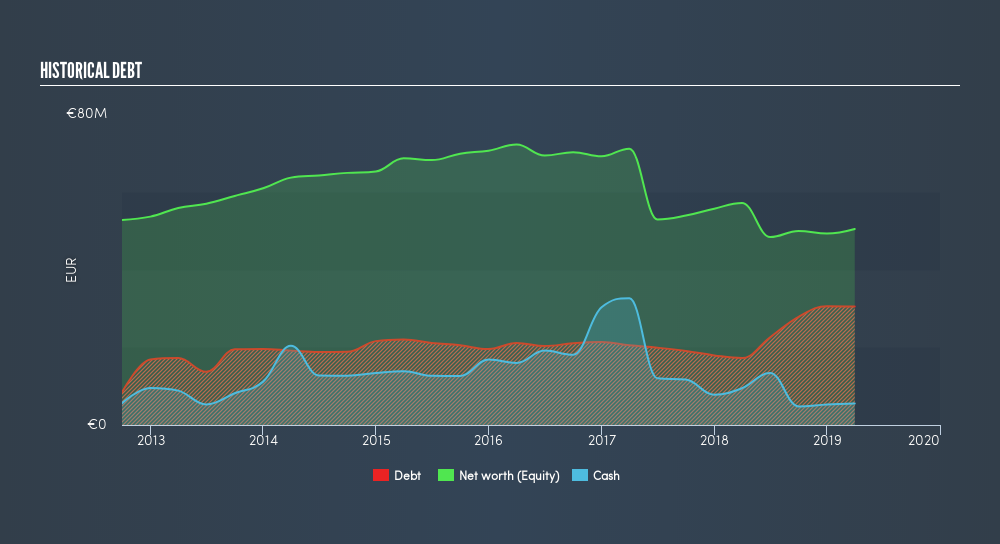
Want to participate in a short research study? Help shape the future of investing tools and you could win a $250 gift card!
Warren Buffett famously said, 'Volatility is far from synonymous with risk.' It's only natural to consider a company's balance sheet when you examine how risky it is, since debt is often involved when a business collapses. As with many other companies. City Service SE (WSE:CTS) makes use of debt. But is this debt a concern to shareholders?
When Is Debt A Problem?
Debt is a tool to help businesses grow, but if a business is incapable of paying off its lenders, then it exists at their mercy. Ultimately, if the company can't fulfill its legal obligations to repay debt, shareholders could walk away with nothing. However, a more frequent (but still costly) occurrence is where a company must issue shares at bargain-basement prices, permanently diluting shareholders, just to shore up its balance sheet. Of course, debt can be an important tool in businesses, particularly capital heavy businesses. The first step when considering a company's debt levels is to consider its cash and debt together.
Check out our latest analysis for City Service
What Is City Service's Net Debt?
As you can see below, at the end of March 2019, City Service had €44.7m of debt, up from €21.3m a year ago. Click the image for more detail. On the flip side, it has €5.54m in cash leading to net debt of about €39.2m.

A Look At City Service's Liabilities
We can see from the most recent balance sheet that City Service had liabilities of €51.0m falling due within a year, and liabilities of €35.1m due beyond that. Offsetting this, it had €5.54m in cash and €41.9m in receivables that were due within 12 months. So its liabilities outweigh the sum of its cash and (near-term) receivables by €38.7m.
This deficit isn't so bad because City Service is worth €74.0m, and thus could probably raise enough capital to shore up its balance sheet, if the need arose. But we definitely want to keep our eyes open to indications that its debt is bringing too much risk. Because it carries more debt than cash, we think it's worth watching City Service's balance sheet over time.
We measure a company's debt load relative to its earnings power by looking at its net debt divided by its earnings before interest, tax, depreciation, and amortization (EBITDA) and by calculating how easily its earnings before interest and tax (EBIT) cover its interest expense (interest cover). The advantage of this approach is that we take into account both the absolute quantum of debt (with net debt to EBITDA) and the actual interest expenses associated with that debt (with its interest cover ratio).
City Service has a debt to EBITDA ratio of 3.41, which betrays significant debt, but is still pretty reasonable for most types of business. However, its interest coverage of 10.4 is very high, suggesting that the interest expense may well rise in the future, even if there hasn't yet been a major cost attached to that debt. Importantly, City Service's EBIT fell a jaw-dropping 38% in the last twelve months. If that earnings trend continues then paying off its debt will be about as easy as herding cats on to a roller coaster. When analysing debt levels, the balance sheet is the obvious place to start. But you can't view debt in total isolation; since City Service will need earnings to service that debt. So when considering debt, it's definitely worth looking at the earnings trend. Click here for an interactive snapshot.
Finally, while the tax-man may adore accounting profits, lenders only accept cold hard cash. So we clearly need to look at whether that EBIT is leading to corresponding free cash flow. Happily for any shareholders, City Service actually produced more free cash flow than EBIT over the last three years. There's nothing better than incoming cash when it comes to staying in your lenders' good graces.
Our View
While City Service's EBIT growth rate has us nervous. For example, its conversion of EBIT to free cash flow and interest cover give us some confidence in its ability to manage its debt. Looking at all the angles mentioned above, it does seem to us that City Service is a somewhat risky investment as a result of its debt. Not all risk is bad, as it can boost share price returns if it pays off, but this debt risk is worth keeping in mind. Another positive for shareholders is that it pays dividends. So if you like receiving those dividend payments, check City Service's dividend history, without delay!
At the end of the day, it's often better to focus on companies that are free from net debt. You can access our special list of such companies (all with a track record of profit growth). It's free.
We aim to bring you long-term focused research analysis driven by fundamental data. Note that our analysis may not factor in the latest price-sensitive company announcements or qualitative material.
If you spot an error that warrants correction, please contact the editor at editorial-team@simplywallst.com. This article by Simply Wall St is general in nature. It does not constitute a recommendation to buy or sell any stock, and does not take account of your objectives, or your financial situation. Simply Wall St has no position in the stocks mentioned. Thank you for reading.
About WSE:CTS
City Service
Provides facility management and integrated utility services in Lithuania and Latvia.
Outstanding track record with adequate balance sheet and pays a dividend.
Market Insights
Community Narratives





